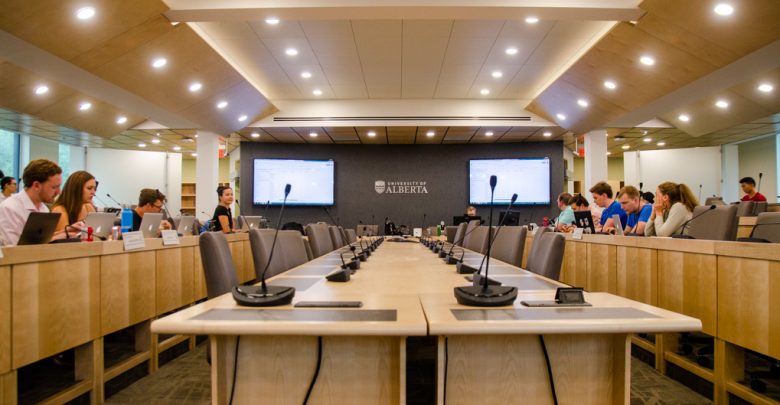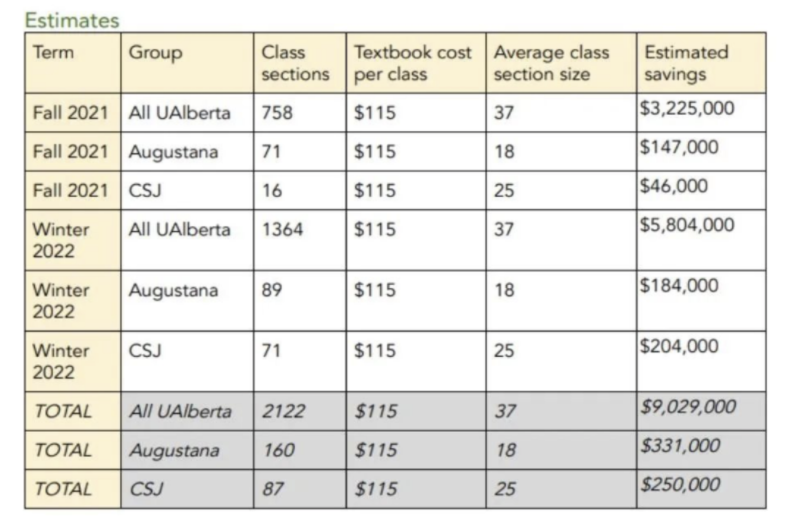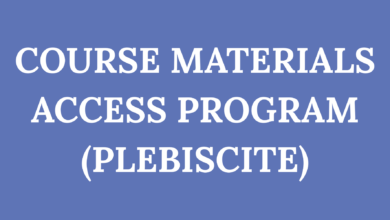Notes from Council: Interim Board of Governors representative elected, concerns raised over in-camera session
Adrian Wattamaniuk, president at the Engineering Students' Society at the U of A, was elected as the interim Board of Governors representative.
 Richard Bagan
Richard Bagan“Notes from Council” is The Gateway’s ongoing series of recaps of noteworthy items from Students’ Council meetings.
Adrian Wattamaniuk elected as interim Board of Governors representative during in-camera session, engineering student calls in-camera voting a violation of Students’ Union legislature
During the January 25 Students’ Council meeting, the interim Board of Governors (BoG) representative was selected via a replenishment election. Differing from general elections and by-elections, where students directly elect their representatives, the replenishment election meant Students’ Council was responsible for appointing an interim representative.
The BoG candidates for the replenishment election were:
- Adrian Wattamaniuk
- Chris Beasley
- Daniela Carbajal
- Haruun Ali
All four candidates were interviewed in an in-camera session by the members of the Students’ Council. After candidates were interviewed, voting members of Students’ Council voted on an interim BoG representative, which was also conducted in-camera.
Once the in-camera session was concluded, Wattamaniuk was announced as the selected interim BoG representative.
“I’d like to take this moment to announce that Adrian Wattamaniuk [has been] elected as the interim undergraduate BoG representative by a majority preferential vote, as elected by council,” Philip Miheso, speaker of council, said.
Chanpreet Singh, engineering student, followed this meeting by filing an application to the Discipline, Interpretation, and Enforcement (DIE) Board. Singh is also the president of the International Students’ Association (ISA), but did not file this application in his capacity as an elected student official. The DIE Board serves as the ‘court’ of the Students’ Union, and is responsible for interpreting and enforcing the the Students’ Union’s bylaws.
Singh’s application alleged a “violation of Student[s’] Union Legislature by the Students’ Union Council by conducting a vote in an in-camera session” and “not using preferential ballot either as required by bylaw.”
In his DIE Board filing, Singh specifically claims that the SU Council broke the following pieces of UASU legislature:
- Bylaw 100 Section 6.5.: The appointment will be made with respect to a vote by Council using a preferential ballot.
- Structure of Sessions Section 2. j. Closed Session.: Closed session will only be held if items have been submitted to the speaker for discussion in closed session. The only items that may be submitted to the closed session are discussion or information items.
Singh’s application noted it is “unknown [if] Bylaw 100, Section 6.5 was also violated or not,” but claims “it’s highly likely that a normal ballot was used rather than a preferential ballot.” In his application, Singh offered no further evidence to support this claim. His application requests the speaker of council “provide clarification on if the preferential ballot was used” and “what was the voter turnout along with votes cast for each candidate.”
A response provided from Miheso rejected this allegation, saying the Students’ Union “ha[s] no idea what led the applicant to believe that a ranked ballot was not used” and described it as “concerning to see [the applicant] making a very serious allegation on the basis of unsupported speculation.”
Voting during Students’ Council is done via Google Forms — the link for which is provided in the Zoom chat. For the BoG replenishment election, this process was done during the in-camera session. Miheso’s response stated “neither standing orders or bylaw state explicitly that a voting link cannot be distributed before going ex camera.”
Additionally, Miheso’s response said “interviews and subsequent discussion about candidates is best described as a discussion item,” and therefore “the fact that Council discussed the candidates in-camera is not a violation” of Students’ Union legislation. For the future, Miheso’s response “agree[d] that it is advisable to move ex-camera before distributing a voting link in order to avoid confusion of this type again.”
None of these accusations have been ruled on by the DIE Board. The DIE Board hearing will be held on January 30, 2022 at 1:00 p.m. via Zoom.
Sexual violence prevention coordinator hired by university, upcoming provincial budget discussed
Talia Dixon, vice-president (student life), began her council report by announcing the hiring of the sexual violence prevention coordinator by the U of A.
“[The hiring of a sexual violence prevention coordinator] builds off the work, not just of myself in this executive team, but off of so many vice-presidents in the past, particularly Andre, Jared, and Katie, so they all deserve huge props for that,” Dixon said. “I’m really looking forward to working with that position to improve the response to sexual violence on campus.”
In response to a question over who would be filling the role, Dixon let council know the sexual violence prevention coordinator position has been filled by Deb Eerkes, who is the current director of student conduct and accountability, for a two-year period.
“[The hired sexual violence prevention coordinator] is Deb Eerkes — she has worked at the university for a long time, and has been involved in numerous sexual violence projects both on and off campus.”
Emily Kimani, vice-president (operations and finance), gave council an update on a new period product dispenser going up at Campus Saint-Jean.
According to Kimani the Students’ Union (UASU) has worked with the Association des Universitaires de la Faculté Saint-Jean (AUFSJ) to secure a location on the campus, and are currently in the process of ordering products for the dispenser.
“We will have a dispenser going up on Campus Saint-Jean, and we’re really excited about this,” she said. “We’re in the process of finally finalizing the details, so we’ll let you all know when that is up and running. But this was a really big goal for Talia and I, so we’re really excited about that.”
Christian Fotang, vice-president (external), gave an overview of preparation for upcoming advocacy weeks.
“My last week has mostly been working to schedule meetings with Edmonton city councillors for Edmonton Student Alliance Advocacy Week, [while] also prepping for Canadian Alliance of Student Associations’s (CASA) Advocacy Week and Supercon,” he said.
Abner Monteiro, vice-president (academic), provided estimates cost savings from the Zero Textbook Cost Indicator Program for the Fall 2021 semester.

“We’ve managed to save overall students $9 million between last semester and this semester based on our cost estimates for how much students spend on textbooks per semester,” Monteiro said. “The numbers for instructors that have gotten involved started at around 500, including last semester, and almost doubled — more than doubled for this semester.”
“We have almost 2,000 instructors that have enrolled in the program… which means that the advocacy faculty associations have been doing have been paying off.”
During his council report Rowan Ley, UASU president, described the upcoming provincial budget as “the main issue” the UASU will be dealing with over the next month.
“We do anticipate that this budget will be pretty ugly for post-secondaries… based on current signals and historic patterns we expect a roughly $50 million cut to the U of A,” Ley said. “I feel that this is not justified in current circumstances especially [because] we have cut more than our fair share, and we have reduced our spending to below the Canadian average.”
“The province also is highly likely to post a surplus this year because of rising global oil prices, which takes a lot of wind out of the sails of the whole argument for making cuts to post-secondaries in the first place — it is no longer about fiscal responsibility. So we’ll be discussing that a lot more of in the coming weeks.”
World University Service of Canada (WUSC) and Student Legal Services (SLS) referendum questions referred to bylaw committee, referendum questions of student associations and societies approved via omnibus
Kimani moved to refer the writing of a question for the WUSC DFU Fee proposal to UASU bylaw committee. WUSC works to bring students from refugee camps to study at the U of A as permanent residents. Their current fee, which is expiring this year, is $0.52 per semester per undergraduate student and is assessed during the Fall and Winter semesters.
Their proposal asks to increase the levy to $1.50 per semester, to allow for the sponsoring of one additional student every two years, and to compensate for lost funding from the university due to budget cuts.
After voting members of Students’ Council voted, the motion passed. The proposal will be referred to the Bylaw Committee, which will further discuss the proposal before it is brought to council again.
Ley moved to refer the SLS referendum question to Bylaw Committee a draft a question. The SLS dedicated fee, which allows for SLS to provide free legal services to U of A students, currently charges each undergraduate student $0.81 per Fall and Winter semester.
SLS’s proposal asks to increase the fee to $3.00 per undergraduate student per semester, which they described as “reflect[ing] both an inflation of the present fee and the costs of implementing new services.”
This motion passed, and the proposal will be referred to bylaw committee.
As motioned by Andrew Batycki, engineering councillor, the approval of the Education Students’ Association Faculty Association Membership Fee (FAMF) referendum question, International Students’ Association Fee referendum question, Interdepartmental Science Students’ Society (ISSS) referendum question, and Augustana Students’ Association (ASA) referendum question were voted on via omnibus.
All four of these motions were passed, and will appear on the ballot at UASU elections.




